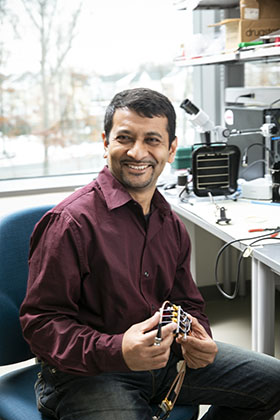
Siddhartha Sikdar. Photo by Ron Aira/Creative Services
Bioengineering professor Siddhartha Sikdar is using technology to help individuals with limb loss better control their prostheses.Â
His team is investigating a new way to operate prostheses using ultrasound waves to sense muscle activity.Â
“Our goal is to help amputees go about their daily lives with improved function,” says Siddhartha Sikdar, who is director of the (CASBBI).
Approximately 50,000 individuals are living with upper limb loss in the United States. A large proportion (35 to 45 percent) of people with upper extremity amputations discontinue the use of their prosthesis, mainly due to limited functionality and usability, Sikdar said, and there is a significant unmet need to develop better technological solutions to improve function.
His research group was recently awarded a Bioengineering Research Partnership grant from the National Institutes of Health to develop this technology for commercial use and perform clinical trials.
They are collaborating with the Walter Reed National Military Medical Center to test this technology in a military population using another new grant from the Department of Defense. They also have a grant from the Commonwealth Research Commercialization Fund to explore prosthetic training applications using a wearable ultrasound system.
The team is completing additional preliminary studies in amputee subjects using a benchtop system. In the meantime, they are in the process of miniaturizing the ultrasound instrumentation to incorporate it inside a prosthetic socket and developing and testing embedded algorithms for interpreting the ultrasound signals for controlling the prosthetic hands.
The next steps are to perform laboratory tests of an integrated system with people with amputations and perform safety evaluations in preparation for seeking FDA approval.
The successful completion of this research will lead to the first human evaluation of an integrated prototype that uses low-power portable imaging sensors and real-time image analysis to sense residual muscle activity for prosthetic control, he says.
“In the long term, we anticipate that the improvements in functionality and intuitiveness of control will increase acceptance by amputees,” Sikdar says.
